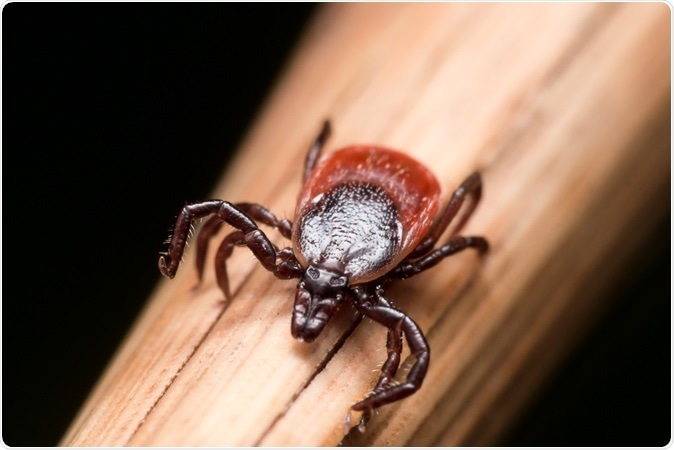The Centers for Disease Control and Prevention (CDC) has released a new report warning people about the myriad of diseases that are transmitted via bites of blood-sucking insects such as ticks, mosquitoes and fleas calling it a “growing health problem” in the United States.

Close up photo of adult female deer tick crawling on piece of straw. Image Credit: Steven Ellingson / Shutterstock
These diseases are called vector borne diseases and the report suggests that these have tripled in numbers throughout the country. In 2004 for example 27,388 cases were reported and this jumped to 96,075 cases reported in 2016. The Vital Signs report was published yesterday (1st of May 2018) by the CDC.
The report explains that these vectors or insects are capable of carrying and transmitting pathogenic organisms such as bacteria, viruses and parasites. They transmit the infection from one host to another. Some of the notorious infections transmitted by these vectors include Lyme disease, Zika virus infection and West Nile virus infection. Dr. Lyle Petersen, one of the authors of the report as well as director of the CDC's Division of Vector-Borne Diseases says that for most of us these seem like just “summertime nuisances”, but people need to be aware that ticks and mosquito bites can give rise to “severe diseases”.
According to the World Health Organization (WHO) 17% of all infectious diseases are caused by these vectors. The report suggests that these infections are growing at an alarming pace in the US. The information in the report comes from the National Notifiable Disease Surveillance System that spans between 2004 and 2016. In this report, 16 different vector borne illnesses are identified. These include –
- Lyme disease
- Spotted fever rickettsiosis
- Anaplasmosis/ehrlichiosis
- Powassan virus
- Babesiosis
- Dengue hemorrhagic fever
- Zika
- Tularemia
- Malaria
- West Nile virus infection
- Chikungunya virus
- St. Louis encephalitis virus
- California serogroup viruses
- Yellow fever virus
- Eastern equine encephalitis virus and
- Plague
During the time of the surveillance a total of 642,602 cases of vector-borne diseases were recorded. The report says that of all the infections, those transmitted by ticks were most common (75 percent). Tick borne infections rose from 22,527 cases in 2004 to 48,610 cases seen in 2016. Among all the tick-borne illnesses, Lyme disease accounted for 82 percent of all cases. The report suggests that mosquito borne infections tended to occur in epidemics and rose from 4,858 in 2004 to 47,461 in 2016. Zika viruses borne by mosquitoes have shown one of the largest leaps during this period. West Nile virus infections remain the most common mosquito borne infections in the US. There were 17 cases of flea-borne plague infections a year during the study period, the report says.
According to the report, during this period, nine new vector-borne infections have emerged as threats. These include seven new tick-borne infections and some of these are –
- Tick borne viruses - Heartland and Bourbon
- Tick borne spotted fevers by Rickettsia parkeri and Rickettsia 364D
- Tick borne new Ehrlichia species
- Lyme disease caused by Borrelia miyamotoi and Borrelia mayonii bacteria
- Mosquito borne viruses Zika and Chikungunya
CDC Director Dr. Robert Redfield said in a statement, “…we don't know what will threaten Americans next.” According to Dr. Lyle Petersen the reason for this rise is warmer weather and a rise in tick and mosquito population. More movement of people across the planet also raises the risk of exposure to these insects he explained. The authors of the report state that this study could be the proverbial tip of the iceberg, since it shows only the reported cases and many more could have gone unreported.